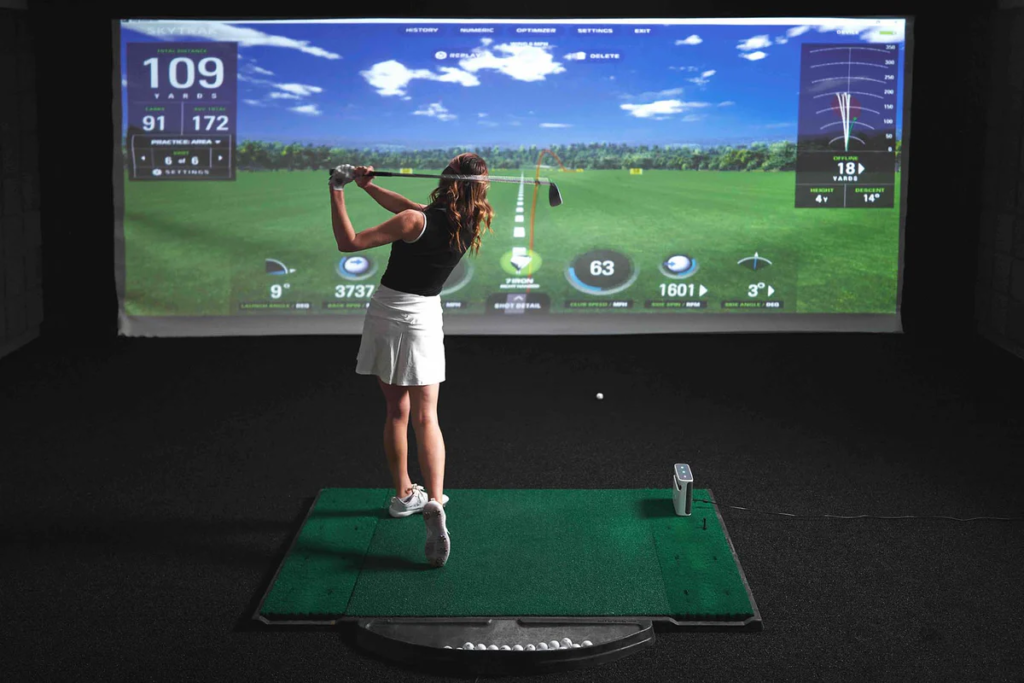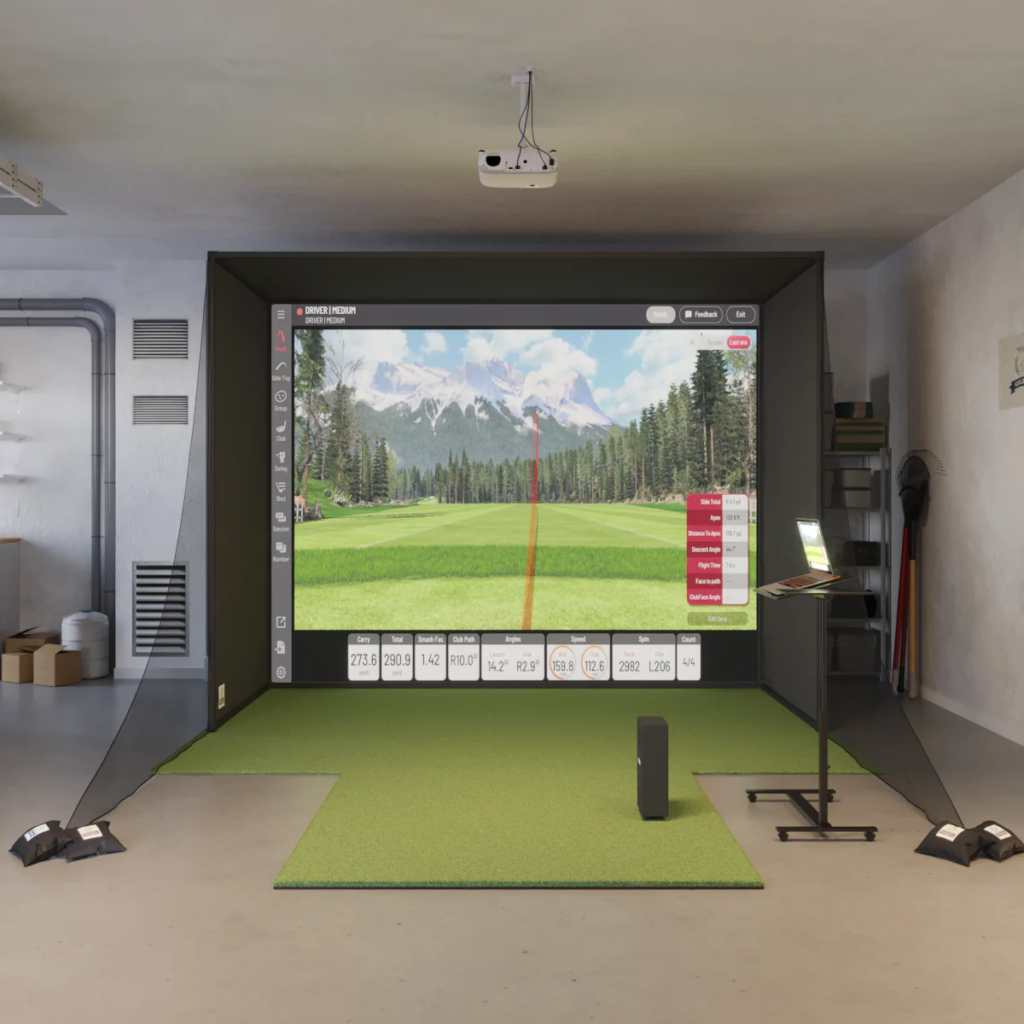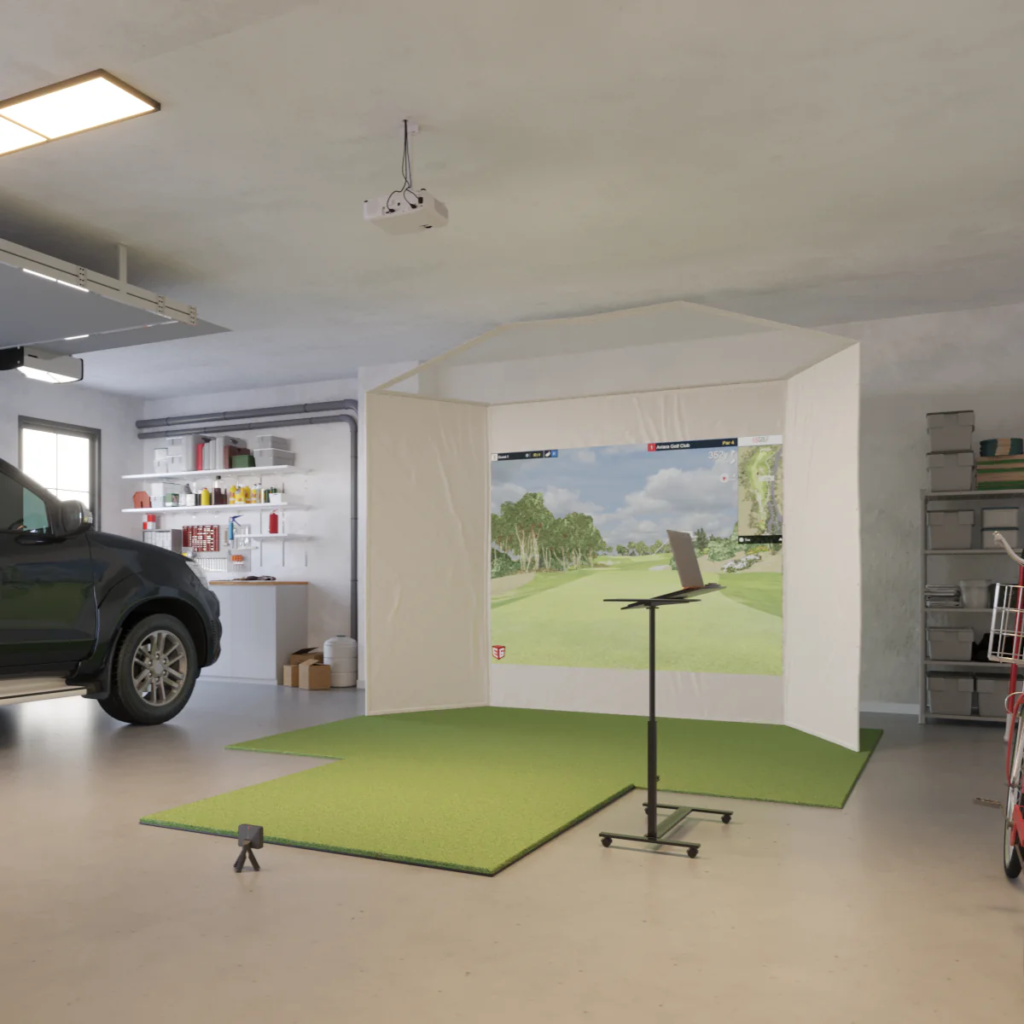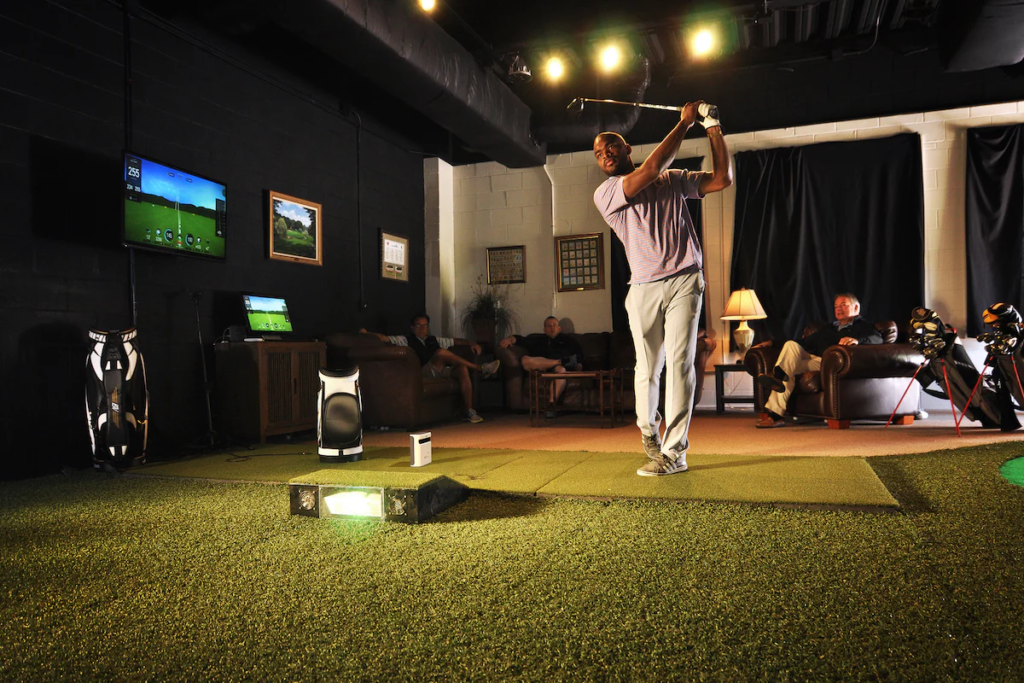One of the biggest mistakes golfers make when setting up a simulator is not having enough space. A cramped setup can affect swing comfort, limit shot tracking accuracy, and even cause equipment damage. Whether you’re installing a simulator in your home, garage, or business, knowing the exact space requirements ensures you get the best experience without limitations.
Golf professionals and club fitters emphasize that having enough space is just as important as the simulator itself. According to Foresight Sports, a leading simulator manufacturer, “Ensuring the right amount of space allows for accurate tracking, proper ball flight, and a more immersive experience.”
This guide covers the ideal dimensions for different setups, including home simulators, small spaces, apartments, commercial facilities, and professional training environments.

How Tracking Technology Affects Space Requirements
The amount of space needed for a golf simulator depends largely on the tracking technology it uses. Camera-based launch monitors, such as SkyTrak+, Uneekor EYE XO, and GCQuad, capture high-speed images at impact. Because they measure club and ball data in a fixed hitting area, they work well in smaller spaces without needing extra depth. This makes them ideal for indoor use in rooms with limited square footage.
Radar-based systems, including TrackMan, FlightScope X3, and Full Swing KIT, use Doppler radar to track the ball’s full flight. Since these systems require the ball to travel several feet after impact, they need more space behind the golfer to generate accurate readings.
This makes them better suited for garages, basements, outdoor setups, or larger simulator rooms. Choosing the right technology for your space can determine whether a setup feels natural and realistic or restrictive and inaccurate.
Golf Simulators for Home: How Much Space Do You Really Need?

SkyTrak+ SwingBay Golf Simulator Package
Perfect for home use. The SkyTrak+ SwingBay Golf Simulator Package offers precise shot tracking, instant feedback, and a premium enclosure for a true-to-life experience. Ideal for golfers who want a high-quality simulator setup right at home.
Setting up a golf simulator at home allows for year-round practice, game improvement, and entertainment. However, ensuring you have enough room for a full swing and accurate tracking is essential before making a purchase.
- Width: At least 10 to 12 feet for a comfortable swing path, especially if left- and right-handed players will use the setup.
- Depth: A minimum of 15 feet ensures proper shot tracking. Radar-based systems may require even more space.
- Ceiling Height: 9 feet or more is recommended, though taller golfers and those using drivers may need 10 feet or higher.
The SkyTrak+ SwingBay Golf Simulator Package is a solid home-friendly option. It provides high-precision camera tracking and works well in most indoor spaces. For a more advanced home experience, the Uneekor EYE XO2 SwingBay Golf Simulator offers multi-angle tracking and detailed shot analysis while still fitting into a standard-sized room.
For homes where space is shared, a retractable setup is a great alternative. The Garmin Approach R10 Retractable Golf Simulator allows golfers to set up and store the simulator easily, making it ideal for multi-purpose spaces.
Best Golf Simulators for Small Spaces: Space Needed & Top Options

Uneekor EYE MINI LITE SwingBay Golf Simulator
Ideal for small spaces. The Uneekor EYE MINI Lite SwingBay Golf Simulator Package delivers pro-level accuracy, instant feedback, and a compact design. Perfect for golfers who want a high-quality setup without needing a large room.
Not everyone has a dedicated simulator room. Many setups are in basements, offices, or shared spaces, where every inch of room counts.
- Width: At least 10 feet for an unrestricted swing path.
- Depth: 12 to 15 feet for accurate tracking.
- Ceiling Height: 9 feet or more for full club clearance.
For compact areas, camera-based systems are best since they don’t require extra space behind the golfer. The Uneekor EYE MINI Lite SwingBay Golf Simulator delivers detailed ball and club data without needing radar tracking. If space is extremely limited, the Garmin Approach R10 Retractable Golf Simulator Package provides a portable, space-saving solution.
For golfers without dedicated space, using a hitting net instead of an impact screen reduces space requirements while maintaining a realistic training environment.
How Much Space Do You Need for an Apartment Golf Simulator?

Garmin Approach R10 Retractable Golf Simulator
Perfect for apartments and small spaces. The Garmin R10 Retractable Golf Simulator Package offers accurate shot tracking, instant feedback, and a space-saving retractable design. Ideal for golfers who need a high-quality setup that’s easy to store.
Apartment-friendly simulators must be compact, quiet, and easy to store when not in use. Shared spaces often require retractable or net-based setups to avoid permanent installations.
- Width: 10 feet to allow an unrestricted swing.
- Depth: 12 feet for proper ball flight tracking.
- Ceiling Height: 9 feet or more, depending on the golfer’s height and club choice.
The Garmin Approach R10 Retractable Golf Simulator Package is one of the best apartment-friendly options. It allows golfers to set up quickly and store it away when not in use.
For a permanent but compact setup, the SkyTrak+ Practice Golf Simulator is a great choice. It offers high accuracy in a space-efficient design. Golfers in tight spaces might also consider a standing-only swing analyzer like PhiGolf 2 or Exputt RG, which simulate golf swings and putting without requiring a full hitting area.
Golf Simulators for Businesses: Space Needed & Best Options

Foresight Sports GCHawk SIG12 Golf Simulator
Built for businesses and elite training facilities. The Foresight Sports GCHawk SIG12 Golf Simulator delivers ceiling-mounted precision, advanced shot tracking, and a spacious hitting area. Perfect for commercial setups that demand top-tier performance.
For commercial golf facilities, sports bars, and coaching centers, a simulator must be durable and highly accurate. These setups handle multiple users and require realistic gameplay features to maximize customer satisfaction.
- Width: 12 to 15 feet for a spacious hitting area.
- Depth: 16 to 20 feet, especially for radar-based systems that track full ball flight.
- Ceiling Height: 10 feet or more to accommodate all club types.
For entertainment venues and sports bars, the TrackMan iO SwingBay Golf Simulator is a top choice. It provides tour-level accuracy, multiplayer modes, and an extensive course library.
Businesses focused on club fitting and golf lessons should consider the Foresight Sports GCQuad SwingBay Golf Simulator. Its quad-camera tracking system delivers the detailed club and ball data that professionals need.
In high-traffic commercial spaces, overhead-mounted tracking systems like the Foresight Sports GCHawk SIG12 improve efficiency. Since they don’t require repositioning for left- and right-handed golfers, they allow for a seamless playing experience.
For businesses aiming to offer a premium golf experience, simulators with tournament play, skill challenges, and customizable games enhance engagement and encourage repeat customers.
What If You Don’t Have Enough Space for a Golf Simulator?
Not every golfer has the luxury of dedicating a full room to a simulator. If space is tight, there are several ways to still enjoy an indoor golf experience. Retractable simulator setups, such as the Garmin Approach R10 Retractable Golf Simulator Package, allow users to quickly assemble and store their system when needed.
Compact, net-based systems, like the SkyTrak+ Practice Golf Simulator, eliminate the need for a large impact screen and can be used in tighter spaces.
For golfers who can’t take full swings indoors, standing-only swing analyzers like PhiGolf and Exputt RG provide a simulation experience without requiring extra room. By choosing the right type of simulator, even those with limited space can still benefit from indoor golf practice.

Final Thoughts: How Golf Simulators Are Evolving
Understanding space requirements is essential for getting the most out of a golf simulator. Whether setting up in a home, apartment, or commercial space, ensuring enough width, depth, and ceiling height allows for accurate tracking and a realistic playing experience.
For those with limited space, camera-based options like SkyTrak+ and Uneekor EYE MINI Lite provide reliable accuracy without requiring excessive depth. Larger setups, including TrackMan iO and Foresight Sports GCQuad, offer top-tier performance for golfers who have more room.
As technology advances, golf simulators are becoming more space-efficient. AI-driven tracking and improved camera optics are reducing the amount of space needed for accurate shot analysis. These innovations will make high-end simulators more accessible to golfers with space limitations, improving the indoor golf experience for both casual and serious players.
Golf instructors and club fitters stress that having enough space is just as important as the simulator itself. As Foresight Sports notes, a well-planned setup leads to better accuracy, a smoother playing experience, and long-term usability.
Regardless of space constraints, there’s a golf simulator for every type of golfer. With the right setup, you can enjoy year-round play, track your performance, and improve your game from the comfort of your own space.
